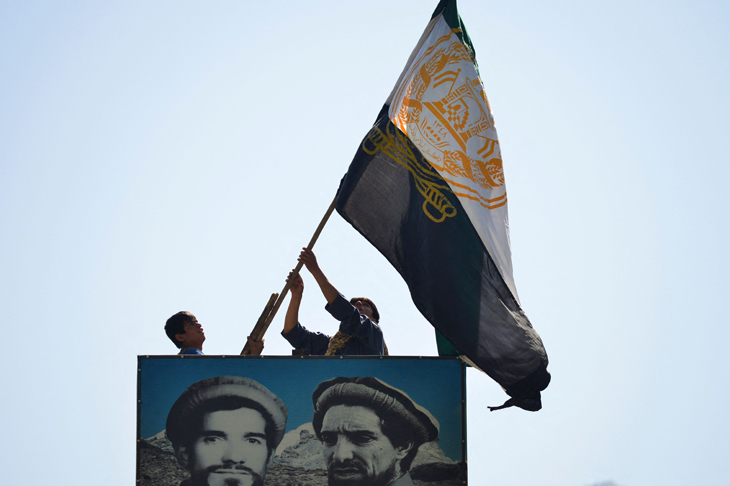Mark Twain reportedly said ‘God created war so Americans would learn geography’. Former defense secretary Robert Gates said Joe Biden had been wrong on nearly every major foreign policy and national security issue for four decades before becoming president. The humiliating US withdrawal from Afghanistan – all exit, no strategy – will cement that judgment. It validates Barack Obama’s warning: ‘Don’t underestimate Joe’s ability to f—k things up’. The defining metaphor of the debacle will be two photos from 15 August (coincidentally the anniversary of Japan’s surrender in 1945): the bodies falling from the departing US plane at Kabul airport and Biden sitting all alone at a vast desk on vacation at Camp David, watching events unfold on the screen. Visibly old, isolated, feeble and a helpless spectator to history spiralling out of control in front of his eyes.
At a major international conference in New Delhi some years ago, former Afghan president Hamid Karzai began his keynote address by quoting lines from a popular Hindi song from the 1960s to describe Afghanistan-US relations: ‘Tread warily, Sir. Stay alert on the road of romance. There be many pitfalls and betrayals on that path’.
On 9/11, the twin towers in Manhattan were destroyed by planes hijacked in an operation masterminded from Afghanistan. The images of people falling to their death then and from an American plane at Kabul airport this month mark 20-year bookends to the failures of this century’s muscular liberal internationalism. The US war on Taliban-ruled Afghanistan after 9/11 was a legitimate act of self-defence against armed attack but the protracted state-building gradually unravelled and Afghanistan became a lost cause. The illegal invasion and occupation of Iraq in 2003 dissipated focus from Afghanistan and nation-building there proved equally unsuccessful. In Libya in 2011, Muammar Gaddafi was ousted, captured and killed by Nato-led forces but ongoing volatility, violence and instability saw Libya too descend into ‘a failed state and a terrorist haven’. Although Western forces did not intervene in the Syrian conflict with ground troops, they armed anti-government rebels and launched air strikes against Islamic State targets inside Syria while Russia intervened to support Assad.
All four of Afghanistan, Iraq, Libya and Syria stopped functioning as sovereign states. Four US presidents – two Democrats and two Republicans – share responsibility for the pathological state of affairs with the entire region consumed by sectarian, tribal and jihadist violence. Foreign interventions in fragmented countries deepened sectarian fissures and tipped hostile groups into civil war. None of the regimes installed by foreign force succeeded in consolidating state authority such that they could survive the withdrawal of foreign backers. The swath of ungoverned territories from Afghanistan through the Middle East to North Africa is graphic evidence that no humanitarian crisis is so grave that it cannot be made worse with outside military intervention. Good intentions do not guarantee good policy outcomes in hostile faraway lands.
On 8 July, barely a month before the spectacular disintegration of the state of Afghanistan, in a performance worthy of Fantasia on steroids, Biden rubbished any suggestion of a collapse following US exit. With 300,000 well-equipped troops, ‘as well as any army in the world’, confronting just 75,000 Taliban, he boasted, the Afghan army had ‘the capacity to sustain the government in place’. That video has been playing endlessly in recent days. More recently, his national security adviser Jake Sullivan emulated Comical Ali from Baghdad in 1991 in insisting that the administration had overseen a ‘successful drawdown of our embassy’ in Kabul.
Biden must cope with the foreign policy fallout of emboldened adversaries and disheartened allies. In an unprecedented British rebuke to a US president, on 18 August members of both Houses of Parliament condemned Biden’s handling of the Afghanistan withdrawal as ‘catastrophic’, ‘dishonourable’ and ‘shameful’. Biden’s brief appearance at the White House for one speech blaming everyone else, no questions permitted and then a flight back to his interrupted vacation added to the horror optics of the chaos unfolding at dizzying speed. America isn’t back, it’s fallen flat on its back.
US Speaker Nancy Pelosi issued stern feminist warnings to the Taliban. Jacinda Ardern reminded them to uphold human rights. State Department spokesperson Ned Price urged the Taliban to have women in an inclusive new government. Several UN agencies urged the Taliban to honour their promises to protect the vulnerable. Secretary-General Antonio Guterres addressed the Security Council on 16 August ‘with a heavy heart and deep disquiet’, reminded all parties ‘of their obligation to protect civilians’, in particular women and girls, called for unimpeded access for humanitarian actors and urged all countries to accept Afghan refugees. In the press statement at the conclusion of its meeting, ‘the Security Council called for an immediate cessation of all hostilities and the establishment, through inclusive negotiations, of a new government that is united, inclusive and representative — including with the full, equal and meaningful participation of women’. Don’t hold your breath that any of this UN-speak outbreak of offended sensibilities will make the Taliban quake and repent.
If Afghanistan once again becomes jihad central, one of the countries to suffer the worst will be India. For Australia the most consequential question is how China gains from the geopolitical transformations. China’s leaders will be vindicated in their contempt for a fast-declining power led by a president well into senescence. Far from reining in the impulse to endless self-criticisms of self-loathing Americans who cannot stomach one of the most successful social, political and economic systems in history, Biden fed ‘the West is irredeemably wicked’ narrative to the swamp’s policy beast. The noisy minority might draw solace from the fact that the Taliban is no match for the gender pronouns proficiency of US generals. In an editorial on the 16th, the Global Times, the preferred outlet of China’s wolf warrior diplomacy, referenced the fall of Saigon in this ‘heavy blow to the credibility and reliability of the US’. Ominously, it added: ‘Once a cross-Straits war breaks out while the mainland seizes the island with forces’, ‘the island’s defence will collapse in hours and the US military won’t come to help’. Note that the phrasing is ‘once’, not ‘if’. A companion article bluntly asked: ‘Yesterday’s Saigon, today’s Afghanistan, and tomorrow’s Taiwan?’, while yet another recalled the US abandonment of Iraq, Somalia and Lebanon as well. Perhaps West Point should recruit Taliban commanders. It would be a nice change from lectures on white privilege for cadets to learn from those who can still win a war.
Got something to add? Join the discussion and comment below.
Get 10 issues for just $10
Subscribe to The Spectator Australia today for the next 10 magazine issues, plus full online access, for just $10.
You might disagree with half of it, but you’ll enjoy reading all of it. Try your first month for free, then just $2 a week for the remainder of your first year.














Comments
Don't miss out
Join the conversation with other Spectator Australia readers. Subscribe to leave a comment.
SUBSCRIBEAlready a subscriber? Log in